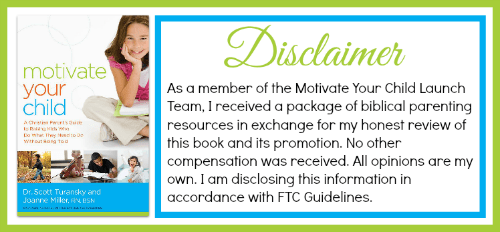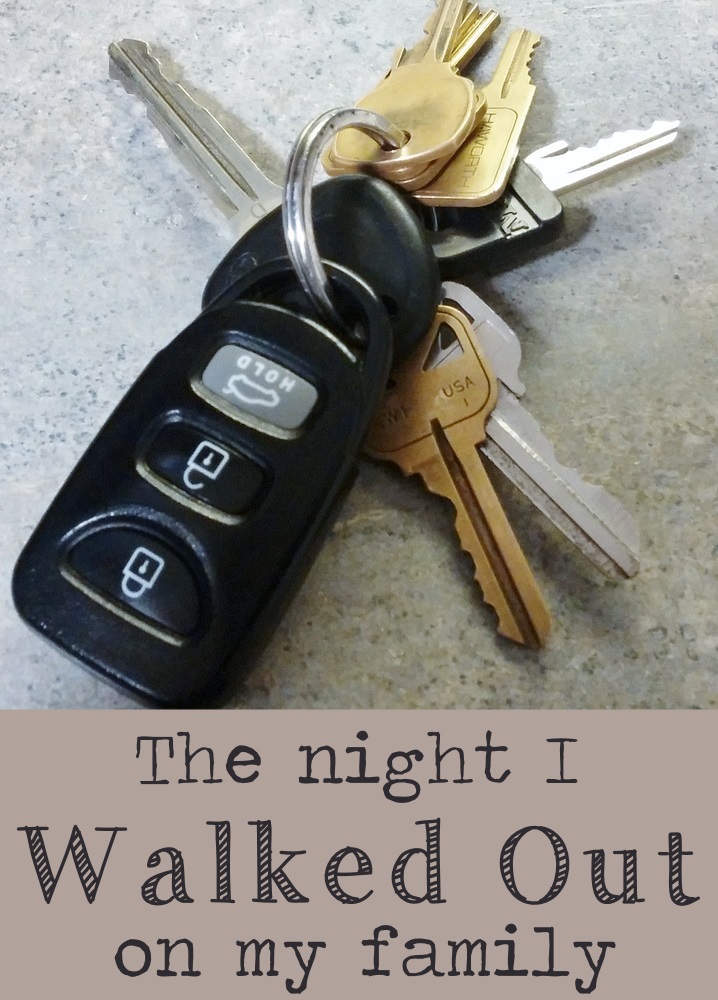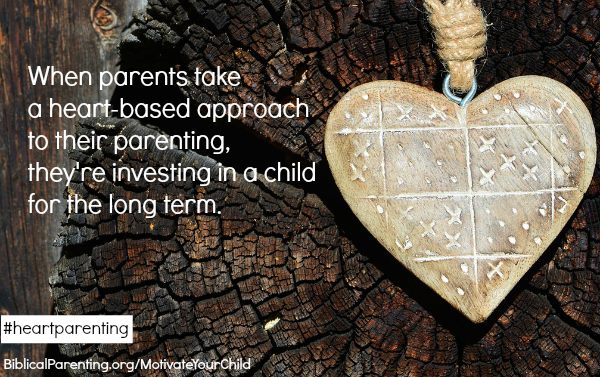Mothering the Way God Made You
“You're special. God made you like no one else in the world!” That's what we want our children to understand, isn't it?
Yet why do we as their mothers often try to be someone else?
We feel we're not good enough if we're not doing this or that activity with them. We feel worthless if our house is not clean enough or supper isn't nutritious enough or if we didn't spend time doing a certain activity with our kids. We can't do that Pinterest-worthy craft very well, but somehow we think it makes us a bad mom if we don't, so we try it anyway and end up frustrated and grouchy.
Many times moms create in their imagination a vision of “the perfect mom” and then try to live up to it. When we inevitably fail at this impossible task, our shoulders stoop in defeat. Is that what you want for your children? To live in a cycle of perpetual defeat from trying to be someone they're not? But we're training them by our own actions that that's what life is all about.
Instead of being discouraged when you don't live up to your standard of perfect mom, be thankful God made you who you are!
Be thankful you still think your kids are adorable even when they're not dressed in the latest clothing styles with coordinating hairbows.
Be glad you love them enough to wash their clothes for them – even if you did have to frantically dig through the laundry basket for a matching pair of socks five minutes before you left the house.
Be thrilled that their bellies are full even though their food in no way resembled the cute bento-box lunch you saw on Pinterest.
“Our joy can't be found in comparison, but in living out our strengths.”
I've been reading through the book Mothering From Scratch, and although I can't completely endorse every word of the book, I have still found it a huge encouragement in my motherhood journey.
The thoughts I've written above were inspired by one of the chapters in the book. One thing the chapter said that is so true, but I so often fail to remember is this:
“Our energy replenishes itself easily when we're working out of our strengths. It also erases competition. When we appreciate our own strengths and personalities and are comfortable with ourselves, we can better apreciate the strengths of others and draw on them.”
Instead of constantly trying to do the things we're not good at – and wear ourselves out and add to our insecurity in the process – we need to focus on what we are good at.
The rest of the chapter goes on to give a number of ways we can deal with the parts of our lives that are not our strengths. There are ways we can get good at things if we are willing to step out of our comfort zone. There are times we can simply ask others to step in and help fill the gaps. There are times when the perceived “gap” in our lives is not truly something that needs to be filled and we can simply choose not to worry about it.
Whatever the case, let's stop trying to be someone we're not. Let's fully embrace who God made us to be and experience the freedom and joy that comes when we loose ourselves from unrealistic ideals.
You can find the book Mothering From Scratch here. I know you will gain much encouragement from it!
You may also like:
The Night I Walked Out on My Family
Tears streamed down my cheeks as I watched three little noses press against the glass of the window. Everything in me longed to run back inside and scoop them up in a big hug and tell them it would be all right.
But I started the Suburban and pulled out of the driveway anyway. I knew we would all be okay even if they didn't know what was going on.
I didn't know where I was going. I was just going.
My first instinct was to head up the road to my mom and dad's house. “No,” I told myself. “I am not going to run to mommy and daddy. I need to run to God.”
So I purposely drove the opposite direction. I didn't know how far I'd drive. I was just driving, crying great big ugly cries, and praying completely unintelligible prayers.
“God, I'm thankful the Holy Spirit is interpreting my prayers and interceding for me right now, because I cannot form a coherent sentence if my life depended upon it,” I said aloud.
Only I don't think it came out that clearly.
The thoughts were swirling a mile a minute. “I can't believe I'm doing this. What is wrong with me? The kids aren't going to understand. My husband doesn't have a clue what my problem is. Dear God, please help me!”
I kept driving, praying, crying, and I threw a little steering-wheel beating in there just for good measure.
Every time I saw a turn-around spot on the highway, I was tempted to head back home and finish my crying in the driveway just so the kids would know mommy would be back after a while.
But I kept driving. I needed more time.
***********************************************************************************************************************
I finally saw a turn-off to another road that would take me in a big circle back toward home. “I'll go that way,” I thought. I'll know exactly where I'm going and I can turn my thoughts away from “Where am I going?” to the bigger problem at hand.
As I drove, I tried to figure out what had brought me to this point.
I had been planning to make pizza for dinner. It was already getting late and everybody was getting hungry. Little feet went pitter-patter behind me as I walked toward the kitchen. “I'm tired, but this should be easy,” I thought to myself. “I've already got the crust made. All I need to do is spread some sauce and cheese on and pop it in the oven. Dinner will be ready soon and we can eat and get these kids to bed.”
But when I opened the refrigerator I was dismayed to find there was no cheese. “I thought we had cheese! Oh great. Now what are we going to have? I need to feed these people so they can go to bed!” I thought.
I walked back down the hallway with my shoulders slumped in discouragement. Little feet went pitter-patter behind me again.
I peeked my head into the computer room where my husband was working. “I was going to have pizza for dinner, but I just found out we don't have any cheese. Now I don't have a clue what we're going to eat,” I told him in a pleading voice. The reason I used a pleading voice is that I really meant, “Can you please make some dinner magically appear or give me an idea of something I can make in a hurry? I really need to put the kids to bed because I need some quiet and alone-time.” Only I didn't say that. All I said was that we didn't have any cheese. So he just looked back at me and said “Oh.”
“Oh,” was not what I was hoping to hear. I was desperately hoping to hear “Honey, go in the bedroom and relax. I'll take care of dinner.” But all I got was “Oh.”
I walked back down the hallway, little feet once again going pitter-patter behind me. But now there was another sound being added to the pitter-patter. “Mom, we're hungry. When are we going to eat dinner?”
“Just…STOP,” I said through gritted teeth, trying with all my might not to explode. I knew if anyone else spoke I would blow my stack. I needed to retreat – and fast. So I went into my bedroom and shut the door. Hard. I wasn't really trying to slam it, I was just trying to make my getaway as fast as possible.
“Why don't you slam that door a little harder?” my husband hollered from the other room.
“Seriously?! Did he just say that? I'm trying so hard not to yell at people here! I'm not allowed to be frustrated?”
“These people have been following me around all day, and I'm just trying to get away for a second!”
So get away I did. I grabbed the keys and my phone and walked out the door.
And now as I found myself driving alone in the dark, I tried to make some sense of the situation in which I found myself.
As I approached the halfway-point of my loop back home, I realized the road to my parents' house was coming up.
“I might as well call mom and see if she has any cheese,” I thought to myself. People are still going to want supper when I do get back home.
Ring. Ring. Silence.
“Great! My phone just died. When mom tries to call me back, she won't be able to reach me. Then she'll call David and he'll tell her that I left without telling him where I was going. Then she'll be worried. I'd better just drive up there and knock on the door.”
Five minutes later, my dad answered the door and asked what in the world I was doing. I don't typically show up at their house at night, without my family, and without having called first.
“Well, I tried to call but my phone died,” I said, trying to hold my voice steady. “I wanted to know if you had any cheese.”
But a daddy's girl can't hide things from him. He just grabbed me in a big hug and said “What's a'matter?”
I blabbered a bunch of incoherent stuff, and my parents didn't say much of anything, which was really all they needed to say. They just said “I'm sorry. We're praying for you.” And my mom said stuff like, “I remember those days.”
Oh. And she gave me some cheese.
I felt a bit better when I left their house, but I still needed to figure out why I was so upset.
*********************************************************************************************************************
I didn't have a real “Aha!” moment, but between the first leg of my drive, the time spent at my parents', and the drive the rest of the way home, I gradually figured out what the problem was.
There was nothing wrong with me. I just flat-out needed a break.
I homeschool the kids, my husband does the grocery shopping for me, and we rarely go anywhere besides church.
I'm with these kids 24/7 every. single. day.
And while I love them with all my heart, one can only stand so much noise. One can only have oatmeal-covered fingers clinging to her skirt for so many hours a day before she needs a personal time-out.
And now that the kids are older, I'm not even getting the quiet of a nap time any more. (They're supposed to have “quiet time”, but…well…you know how that goes.)
I'm often awakened in the morning by the baby, which means I have zero time to myself from the moment I set my feet on the floor until I get into bed at night. And then my poor husband wonders why I scoot away from him and hardly say a word besides a mumbled “G'night. Love you.”
Thankfully, since I did figure out what the problem was, he and I have talked this over, and we're working on a solution.
We'll probably start with my doing the grocery shopping alone rather than having him do it for me. But I wouldn't mind for my breaks to be a little more fun sometimes too. 🙂
So what lessons would I like to share from my experience?
1. Even when you think you're communicating with your husband, that may not actually be the case.
I was trying to tell my husband I was desperate for a break, but the only message he got was that we didn't have any cheese. And then he thought I was slamming the door about it! The poor guy is not a mind reader.
If you need something, tell your husband exactly what you need without hinting.
This is something we've tried to do our entire marriage – he to try to read through my hints, and I to be more direct in saying what I mean. Obviously, we've still got work to do!
2. Give yourself a break.
I think homeschooling moms and moms of toddlers and preschoolers may be in the most danger of experiencing mommy burn-out since they are always with their kids, but I would venture to say that all moms need to be careful to take some time out for themselves. And if you're an introvert like me, some actual ALONE time, not just a date with your husband or a night out with your friends.
I'd like to share some practical ways moms can take time out for themselves, but this post is rather lengthy already, so watch for a follow-up post soon with some ideas!
Have you ever hit your limit as a mother? How did you handle it?
Find more mom-to-mom encouragement on Facebook!
What Does it Mean to Parent the Heart?
Parenting the heart…
That sounds like a pretty phrase, but what does it really mean?
I believe there is a vitally important difference between teaching children to obey you and teaching children to do what is right.
Teaching a child to obey means that when you teach your child to clean his room, he does — as long as you tell him to do it and stand there to make sure he does.
Parenting your child's heart means that your child cleans his room on his own because he has learned the value of diligence in his work.
Teaching a child to obey means that your child shares with his friends – when you tell him he needs to share.
Parenting your child's heart means that your child shares without being told because he has learned that God wants us to be kind to others and think of their needs before our own.
Teaching a child to obey means your child turns off the video game — when you tell him to.
Parenting a child's heart means your child turns off the video game without being told because you've taught him the value of using time wisely.
Don't get me wrong. It is important that parents teach their children to obey.
But if we're not careful, we can end up focusing on our children's actions instead of their heart attitudes.
We are satisfied that they pick up their toys when we tell them to. We are satisfied that they share their toys when reminded. We are satisfied that they turn off the video game when told (and happy when they do it without complaining!)
But what happens when you're not there to tell them to clean up or share or turn off the video game?
When your daughter is grown and married, will her house be a wreck because you're not there to tell her to clean it up?
When your grown children have friends going through a hard time, will they pass them by without a second thought because you're not there to tell them to think of others?
When your son is out on his own will he waste all his time on foolish pursuits because you're not there to remind him to use his time wisely?
When we teach our children to obey, we must teach them the Biblical principles behind what we're telling them to do. We must also help them understand other life situations to which they can apply that Biblical principle.
When you tell your child every little thing he is supposed to do rather than placing the responsibility for his actions directly on him, you are failing to develop that child's conscience. (And after his salvation, you are failing to teach him how to listen to the Holy Spirit's promptings.)
A sensitive conscience and a listening ear to the voice of the Holy Spirit will empower your child to do what is right on his own, without being reminded by mom and dad every time.
Maybe you've never thought about child training this way before. Maybe you knew you should be parenting your child's heart, but lacked the practical instruction to do so.
I was recently given the opportunity to review a brand new book entitled: Motivate Your Child: A Christian Parent's Guide to Raising Kids Who Do What They Need to Do Without Being Told.
I normally do not do book reviews on the blog since I just do not have the time to commit to it. However, this one really caught my eye as one that I'd like to read, so I decided to go ahead and do the review.
I am so glad I did!
I have something highlighted on almost every page of this book! There are so many practical ideas that I want to implement in our family.
For instance, after reading this book my husband and I decided it would be wise to implement a chore chart for our children. There are several things they are expected to do each morning before they start their day. It's not a reward or punishment system. They simply cannot come out of their room until their jobs are done. If the job is in another room of the house they must complete it before they can do anything else.
Rather than expecting them to remember everything or tell them what to do over and over, we gave them a visual reminder – a chart that hangs on the wall in their room. Now the ball is in their court. It's up to them to get the work done without being told. If they want to come out of their room they will get the work done.
Parenting this way takes lots of work and consistency. It's not a magical solution that is going to revolutionize your home overnight. But practice makes perfect – literally! The book contains activities that you can do with your children to practice exercising the conscience until doing right becomes a habit in your child's life.
You can order the book right here.
What changes are you going to make in your home to help direct your child's heart rather than focusing only on his actions?

Dear Mom of the Prodigal Child
Dear Mom of the Prodigal Child,
Before I got married and had kids of my own, I was the perfect parent.
It was going to be so easy. I would simply teach my kids to do right – and they would!
Parents who had wayward children had obviously messed up somewhere down the line. After all, the Bible says “Train up a child in the way he should go, and when he is old, he will not depart from it.” If yours departed from the ways of Scripture, it was your fault.
When I had my own children, everything changed. It wasn’t a sudden change; just a gradual one.
Over time I began to find that the things I taught my kids didn’t always seem to stick. So I’d teach them again. And they still didn’t stick.
Then I realized that sometimes…sometimes it wasn’t that they weren’t understanding or remembering what I’d taught them. They were choosing to do what they wanted to do, even though they knew better.
Although the issues I deal with from a seven-year-old and a five-year-old are small in comparison to a grown child who is committing crimes, living an immoral lifestyle, or just living it up with no thoughts of God, it is still painful to me as a mother when I see a child who has been taught over and over to do right ignore instruction and willfully make the choice to serve self rather than God.
When I see a child who thinks only of himself with no consideration for how his actions affect others and with no regard for what God says about his actions, I shudder to think what that could mean when he is grown. Blatant self-indulgence now in the form of sneaking forbidden candy or soda could easily turn into all kinds of immorality and wickedness in later years. Shirked schoolwork and chores could turn my child into a good-for-nothing adult. Disregard for the property of others now could turn my child into a thief in later years.
And none of it would be because my child hasn’t been taught what is right. My children all have and will continue to be taught what is right – over and over and over.
But I can’t make them do right. They must still choose right on their own.
When one of my children makes a wrong choice, I often second-guess myself. “Did I not make it clear what was right in this situation? Did I not spend enough one-on-one time with this child? Did I focus too much on outward actions and not reach this child’s heart?”
While constant evaluation of my parenting skills will help me do the best job I possibly can, I must not blame every failure of my child on myself. In most cases, the failure occurred simply because my child chose to please self rather than please God.
Rather than scouring parenting books looking for new and better ideas, the best strategy for me to reach my child’s heart is to spend my time on my knees, begging God to do the work in my child’s heart that I cannot do.
Dear mama of the prodigal child: I’m sorry. Perhaps you spent the best years of your life teaching and training your child to do what is right and to serve God with his life. And now you find the child you love so much has ignored what he has been taught and is seeking to find satisfaction in serving himself.
Instead of joining you in prayer for your child, I’ve wondered what you did wrong in your parenting for your child to turn out this way.
Chances are, you’re already second-guessing yourself. You don’t need others to heap more of a burden onto your already stooped shoulders.
Perhaps you really didn’t do a good job teaching your children to do right. Maybe you didn’t know how. Maybe your spouse didn’t support what you were trying to do. Maybe you simply failed to do what you knew you should have done.
That doesn’t make it any less painful to see your child wasting his life and hurting himself, others, and God.
——————————————————————————————————————————————————
Dear mama of the prodigal child,
I know now that the only way to reach the heart of your child is on your knees. Instead of judging you, I’m joining you.
6 Things All Parents Should Say to Their Kids
We've explored some things children should not be allowed to say to adults, but have you considered the way you speak to your children?
“But I'm the parent! I can say what I want!”
Yes, you are the parent, but the Biblical commands to “be kind one to another” and to let our “speech be always with grace” do not exclude the way we speak to our children. The Proverbs 31 woman opened her mouth with the law of kindness, and I don't doubt for a minute that included the way she spoke to her children.
Here are six things I believe all parents should say to their kids:

1. Please.
“Wait. Back up. I'm the parent. They're the kid. I tell them what they're going to do; I don't ask them.”
While children should be expected to obey when they're given a command, I don't think that necessarily means parents need to give commands by simply barking orders. “Son, would you please unload the dishwasher?” sounds so much more pleasant than “Go unload the dishwasher!”
Now, it's important to understand that asking it as a question does not mean that saying “No I won't unload the dishwasher” is an option. My children know that “Please unload the dishwasher” means “Go unload the dishwasher” and that the correct answer is “‘Yes, ma'am, I sure will,” but it just makes the atmosphere of our home more pleasant than barking orders all the time. Sometimes the situation or the attitudes of my kids call for things to be phrased as a direct command, and there is definitely a place for a more no-nonsense approach, but that doesn't have to be the case every time you need them to do something.
By saying please to your child you are recognizing that they are a person who is deserving of just as much respect as anyone else. When all you ever do is bark orders it becomes easy to turn your children into your personal servants. “Pick up that piece of paper I dropped.” “Go put my glass in the sink.” They're your children and need to obey, but they're not your slaves.
2. Thank you.
Just as you should show respect to your kids by saying please, you should teach them how to be grateful to others by showing your gratefulness to them. When your child does something to help around the house, even if it's something you told him to do, thank him for it. Don't you enjoy doing things for others much more when you're thanked for your efforts? You teach your children how to appreciate what others do for them when you show appreciation for what they do at home. Thank your child for a job he's done and see how much more motivated he'll be next time you need him to do something!
3. You're special.
You don't have to use this exact phrase, but every child should know that they are valuable to you. You can show them this by the time you spend with them, but you should also be verbalizing it. Some of the things I say to let my kids know they're special to me:
“You're my favorite 5-year-old!” “I don't know what I'd do without you!” “You're my little princess/prince.” I also have various terms of endearment for each child that I use regularly.
I also like to sing songs to them like “You are my sunshine” or goofy little made-up stuff that I'll spare letting you hear. 🙂
4. Good job.
Again, you don't have to use these exact words, but there is hardly a greater motivation for a child to do what he's supposed to do than to hear his parents verbally express that he did a good job at something. I have one child in particular who thrives on this type of praise, and I simply can't overdo it. When I tell him how happy I am that he finished his dinner without complaining or that he did his best cleaning his room instead of stuffing things in the closet, he absolutely glows! I look for as many things as I can, no matter how tiny, to praise him for. And the more I do it, the more motivated he is to keep on doing what's right.
On the other hand, some children won't see everything they've done as a big deal. Be sensitive to the personality of each individual child. As an extreme example, don't embarrass your twelve-year-old by telling him what a great job he did eating his dinner without spilling it on the floor. Find the things that you know your child worked hard to accomplish and make those into a big deal.
5. I'm sorry.
Try as we might, parents, the reality is we sometimes (more often than we'd like) mess up. You know what's worse than messing up? Not admitting that we've messed up. Your child knows when you've messed up. He knows you're not perfect. So it will mean a lot to him for you to say “I'm sorry I got upset and yelled at you. That wasn't the right way for me to handle the situation. Will you forgive me?” Your credibility with your child will be ten times greater than it would be if you tried to ignore what you did wrong.
6. I love you.
Every child in the world should hear this phrase at least once a day. Unfortunately many don't, and that doesn't only include children living in orphanages or those living in the slums who are passed from caregiver to caregiver. Don't just show your kids you love them; tell them! These words are something every child craves!
What would you add to this list?
6 Things my Kids Are Not Allowed to Say to Adults
One of the most important things I want my children to learn is to respect authority. They will never learn to be obedient to God if they cannot first learn to be obedient to the adults God has placed over them. For that reason, we are very careful to ensure they are being respectful when speaking to adults who are in authority over them.
This is not about being a drill sergeant; this is about helping your child understand his or her proper role in life. Everyone has authorities, even adults, and teaching children to submit to those authorities from an early age will help them their entire life. If your child has a hard time respecting authority now, what will he do when he has his first job and he doesn't want to do what his boss says? You're not doing your child any favors by allowing him to do and say whatever he wants to his authorities.
Here are six things my children are not allowed to say to adults:
(Note: adults here means those that mom and dad have authorized to be over our child. I don't expect my child to just mindlessly do something just because a random adult told him he had to. Teaching children who to obey and when to obey is an important topic too!)
Also, before you read any further, let me stop and say that this is in no way meant to encourage a rule-based, break-your-child's-spirit parenting philosophy. I think a lot of people are interpreting it that way. PLEASE don't parent your kids based on a set of rules. That is dangerous, and a sure-fire way to make sure your kids end up either 1. not knowing how to think for themselves or 2. rebelling against authority. Christian parents must focus on the heart of the matter, treat their children respectfully, show them their love by their actions, and treat their children with gentleness.
However, God has placed you and other adults (teachers, policemen, babysitters, etc.) as authorities in your child's life and God himself commanded children to obey and honor their parents. We as adults are commanded by God to obey our authorities too. The following list is an idea of how that plays out in day-to-day life — again, it's not a set of rules. Being respectful just means properly relating to the authorities that are over them.
Since there have been so many concerns from people who are looking at this through so many lenses (different life experiences, etc.), I'm updating this with specific examples rather than just making these things seem like a blanket statement. Let me say it one more time — this isn't about setting unrealistic expectations and then punishing your child when he doesn't meet them. Nor is it about making certain words taboo. This is about training your children in the proper way to relate to the adults who are over them. It's not the words themselves that are the problem; it's the attitude behind them. A child could just as easily display the same attitude using a different set of words, which is why it always, always comes back to dealing with the heart issues and not just requiring them to conform to an external set of do's and don'ts.
(For more help with teaching children WHY they should obey, I recommend this amazing study by my friend Kim, called Because I Said So. You won't regret going through it with them!)
Okay, so with all that behind us, here we go…
1. “No.”
This is the ultimate defiance toward authority — when a child outright says they will not do what they've been told to do. Just today, one of my boys playfully said “No” when I told him to do something, but went immediately to do it. I stopped him and instructed him that he is never to say “No” to an adult, even in jest. I don't even want him to get comfortable saying it to me or any other authority. It will make it that much easier to say it and mean it if he is allowed to get in the habit of saying it at all. (Update: it seems many are concerned about instances in which a child may find himself being touched inappropriately, asked to go somewhere, etc. That is an entirely different topic, and I DO firmly believe children need to be taught how to handle these situations. They need to know they will never be in trouble with mom and dad for protecting their personal privacy however it needs to be done – including saying no to an adult. For purposes of this post, I am merely talking about instances in which an adult gives a legitimate command; my child is not allowed to tell them no.)
Example:
Me: “Johnny, you need to pick up the toys now.”
Johnny: “No!” (continues playing)
Um…that is a problem.
Me: “Son, when mommy tells you to do something, you don't tell me no. What does God say children are supposed to do?”
Johnny: “Obey their parents.”
Me: “So if you disobey mommy and daddy, who are you disobeying?”
Johnny: “God.”
Me: “That's right. So why should you obey?”
Johnny: “Because God says it's right.”
Me: “For that reason, I cannot allow you to tell me no. I cannot allow you to disobey God by disobeying mommy. Why don't we try this again?”
2.” Just a minute.”
When I tell my kids to do something, I expect them to obey immediately. As one teacher of mine used to say, “Slow obedience is no obedience.” Waiting until they're done with their book, building block tower, or whatever else they're doing is not an option. (They may, however, ask “May I finish this book I'm reading?” Sometimes the answer is yes! Sometimes their help is immediately needed and I must decline their request. If that's the case, they are expected to say “Yes ma'am” and get to work.)
Example:
Me: “Son, I need you to come unload the dishwasher.”
Son: “Just a minute.”
That is not obedience. But maybe he is finishing the chapter in his book. So I teach him, “If you're wanting to finish something you're doing, you need to ask me rather than saying ‘Just a minute.' Let's try it, okay?”
Me: “Son, I need you to come unload the dishwasher.”
Son: “May I finish the chapter in my book first?”
Me: “Sure, but make sure you come straight to the kitchen when you're done.”
Now, sometimes the answer may be, “I'm sorry, I really need your help right away. You'll have to finish your chapter later.”
Either way, he is being respectful to his mother by asking, and I have kept him from feeling oppressed by at least hearing his request.
3. “Yeah.”
Opinions on this may vary depending on your geographical location, but where I'm from, it is incredibly disrespectful to answer any adult with anything but “Yes ma'am”; “Yes sir”; “No ma'am”; and “No Sir”. My kids will definitely be corrected if they answer with a flippant “Yeah” in response to any question. If I lived in an area where yes ma'am an no ma'am are not the culturally respectful way to address adults, I would still teach my children to address their authorities with a respectful tone of voice.
Example: (age 2-3 or whenever they are first being taught)
Me: “Did you put your toys away?”
Child: “Yeah.”
Me: “When mommy asks you a question, you need to answer with ‘Yes, ma'am. Let's try it, okay?”
Me: “Did you put you toys away?”
Child: “Yes, ma'am”
Me: “Good job! You remembered to answer the right way!”
Example (older child who has already been taught):
Me: “Is your room cleaned up?”
Child: “Yeah.”
Me: “Why don't you try that again?”
Child: “Yes, ma'am”
Me: “There you go.”
You see how this works? It's not a “GO TO YOUR ROOM, YOU DISRESPECTFUL LITTLE BRAT!” type of attitude that you're going for. It's a gentle teaching of how to respectfully relate to adults. When you work on these things in your home with mom and dad, they will come naturally to your child when he interacts with other adults. You will most likely still have to do some reminding, but you will still do it the same way you do at home. It's pro-active teaching and gentle reminding, not unrealistic expectations and unreasonable punishment.
4. “I don't want to.”When my kids are told to do something, it is not up for discussion. I didn't ask if they wanted to sweep the kitchen; I told them to do it. If a child cannot learn to do things he doesn't want to do while he is young, there is little hope that he will do what God wants him to do when he is grown, because God doesn't always ask us to do what we want to do either. (Not to mention it's going to be difficult for them to hold a job with this kind of attitude!)
Example:
Me: “Son, please sweep the kitchen floor.”
Child: “I don't want to.”
Me: “I'm sorry. We don't always get to do exactly what we want to do. You're part of this family and we all have to do chores to help things work around here. I don't really want to make supper, but I do it because it's part of what needs to be done. We can't always choose what we have to do, but we can choose our attitude. So why don't we both do our work together and think of something we can be thankful for at the same time?”
5. “I don't like this.”
It kind of cracks me up that there are so many articles online about how to deal with picky eaters. In our house, it's really easy. It goes like this: “Too bad.” If they're hungry enough, they'll eat what is set before them. If not, it goes into the fridge and they can have it again at the next meal. It won't take long before they decide to eat their green beans after all. But eating what they don't like isn't the main issue here. (Practical advice about how to deal with that here.)
The main issue is that they are not to express dislike for their meal. (If they want to respectfully let me know that green beans gross them out, that is one thing. But whining about their food is a different matter. I think you can picture the two different attitudes.) That is disrespectful to whoever took the time to cook for them. They need to learn gratefulness whether the food is their favorite or not. I do, however, think that parents can be respectful to their child as a person. You don't need to give a huge portion of something your child obviously does not like and force them to eat it all. But I will not make a separate meal for them. There are children who didn't get to eat anything today — and I mean that in all seriousness. My children need to be thankful they have something to put into their bellies rather than expressing disgust because they didn't get what they wanted.
Example #1:
Johnny: “I don't like casserole! I wanted chicken!” (in a whiny voice)
Me: “I'm sorry, but that's not what we're having tonight. Mommy will make chicken some other time, but tonight we need to eat this. Did you know that some children didn't even get to eat today? Let's thank God that we have some food to eat.”
Example #2:
Johnny: “Mom, these green beans are making me feel like I'm going to gag.” (you can tell he really is about to gag)
Me: “Ok, thank you for trying one bite at least. You can have some extra salad and you don't have to finish your beans.”
You see how this goes? It's not “EAT IT OR ELSE, EVEN IF YOU'RE GAGGING – MWAHAHA!” It's “I'm not making a separate meal for you just because you wanted chicken.” It's “Let's choose to be grateful instead of whining when we don't get exactly what we want.”
6. Nothing.
When an adult speaks to my children, hiding behind mama and refusing to speak is not acceptable behavior. I understand that some children are shy, and I'm not advocating overlooking their personality traits. However, out of respect for adults, they need to learn to speak when spoken to. A good way to teach them this is to practice at home before you are in a public situation. Pretend you are another adult and say things to your child things like “How are you?” “What is your name?” and “That's a very pretty dress you're wearing!” Then coach your child how to respond and have them practice doing it. Getting comfortable with this at home will greatly help them when they are in public.
Example:
Adult: “Hi Susie. That's a nice dress you have on!”
Susie: (silence)
Me: “Susie, can you tell Mrs. Jones thank you?”
Susie: (silence)
Now, at this point, there are different ways people might deal with this. Some parents will make Susie stand there until she speaks, which makes Susie and Mrs. Jones both embarrassed.
We choose to let it go at that point and do some more practice at home in the way I mentioned above, while also explaining to Susie after the ordeal that it was rude not to speak to Mrs. Jones.
For more help with teaching children about obedience and being respectful toward authority, take a look at Because I Said So. (Hint: It's NOT about teaching children to obey “because you said so”!)
You May Also Like:





















